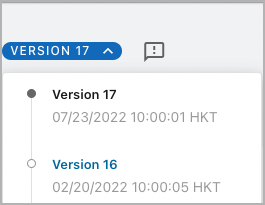Zuora Release 2022.08.R2
Welcome to the release notes for Zuora Release 2022.08.R2. This article is a consolidated page of all release notes for the following Zuora products:
For the latest release notes of Zuora Revenue, see Zuora Revenue release notes.
We welcome and appreciate your feedback on this release notes article. Please use the Feedback button to let us know what you think about the new release notes.
Release schedule
For release schedule details, see this release notification.
For the planned schedule of upcoming Zuora releases, see Zuora Release Management in Zuora Community.
Join Release Notifications in Zuora Community to receive timely notifications about Zuora Billing, Collect, and Central Platform.
UI enhancements
 Reinvented subscription details page generally available
Reinvented subscription details page generally available
The reinvented subscription details page has been in the Beta phase since June. Now, this feature will be made generally available in Production environments in 2022.08.R2. The following enhancements are introduced in this GA release:
- Merged original tabs into a single page
- Added a new Associated Events section. The Associated Events section lists information about invoices, credit memos, and debit memos.
- Added a new Prepayment Balance section
- Added version history list where users can quickly switch between subscription versions

- Removed charge status and added Effective Period in the Included Products section
The reinvented subscription details page is disabled by default. To enable the reinvented subscription details page for individual users, click the top banner notification on any page and then click Enable New Experience in the popup dialog, or edit the user profile to select the Enable New Zuora Experience checkbox. To enable the reinvented subscription details page across all users within a tenant, contact Zuora Global Support.
For more information, see View details of subscriptions through reinvented UI.
 Deprecation of Application Builder
Deprecation of Application Builder
Last year, we released Application Builder as a Beta program. This program provides a tool to give Zuora administrators the ability to configure the UI page layouts. The tool is applicable to Custom Objects UI and the Zuora homepage. However, the implementation of this tool does not meet some of the requirements, so we decided to deprecate this program in 2022.08.R2. The feature will be removed from Sandbox tenants, and the configurations will no longer be available. Meanwhile, we are striving to release a new version of the UI builder tool in the near future.
 Subscription ID column added to Usage page
Subscription ID column added to Usage page
When you navigate to Billing > Usage, the Subscription ID column is added to the list view on this page. You can use this column to view the Subscription ID on each usage record.
Zuora Billing
 Orders and Subscriptions
Orders and Subscriptions
New field for identifying rate plan or product rate plan
A field calledexternalIdSourceSystemis now available to the Subscribe and Amend tenant customers through the Zuora UI or REST API. The value of the externalIdSourceSystemfield is the ID of the external source system.
In case theexternalCatalogPlanId field cannot uniquely identify a rate plan or product rate plan, the externalIdSourceSystem field can be used together with the externalCatalogPlanId field to identify a rate plan or product rate plan uniquely.
Use UI
When adding or editing a product rate plan on the product details page, you can specify the External Id Source System field. The externalCatalogPlanId field does not display in the UI directly. The value of the externalCatalogPlanId field corresponds to an externally managed plan ID specified in the Externally Managed Plan Ids field of the product rate plan. You need to ensure the Externally Managed Plan Ids field is specified before specifying the External Id Source System field.
Use REST API
The externalIdSourceSystemfield can be specified together with theexternalCatalogPlanIdfield in the following nested fields:
- The
subscribeToRatePlansnested field of the “Preview a subscription” and “Create a subscription” operations - The
add,change,remove, andupdatenested fields of the “Update a subscription” operation
When you retrieve a product rate plan by the ID of the product rate plan, this field is displayed in the response body.
Note that retrieving a product rate plan by the externalIdSourceSystem field is not allowed.
A new API operation called “List product rate plans by external ID” is now available. You can use the external ID to list the product rate plans. The externalIdSourceSystem field is also displayed in the response body of this operation.
Note that the external ID is one value of the externallyManagedPlanIds field.
New fields on Order Line Item object
The following fields are now available on the Order Line Item object:
-
soldTo: The ID of a contact that belongs to the billing account of the order line item. Use this field to assign an existing account as the sold-to contact of an order line item. -
soldToSnapshotId: A snapshot of the ID for an account used as the sold-to contact of an order line item. This field is used to store the original information about the account, in case the information about the account is changed after the creation of the order line item. ThesoldToSnapshotIdfield is exposed while retrieving the order line item details.
The Zuora API, data source, and data query have been enhanced to support these fields.
Note that the soldTo and soldToSnapShotId fields determine the tax calculation in the invoice item level.
Behavior change to REST API operations for presenting discount applying details
We have changed the behavior of the following API operations to present which regular charges in a subscription or rate plan can benefit from a specific discount charge. Previously, all regular charges that could benefit from the discount charge were retrieved, including those regular charges that were not within the subscription or rate plan.
- List subscriptions by account key
- Retrieve a subscription by key
- Retrieve a subscription by key and version
To support this change, the following fields have been added to each of the preceding operations:
appliedProductName: the name of a product to which the discount charge appliesappliedProductRatePlanName: the name of a rate plan to which the discount charge appliesappliedProductRatePlanChargeName: the name of a rate plan charge that the discount charge applies
 Invoicing and Tax
Invoicing and Tax
Support for creating bill runs by subscription
When creating an ad hoc bill run for a single account through the Zuora UI, you can now select one or more subscriptions that you want to invoice for the specific invoice owner account in any of the following approaches:
- On the bill run list page, click New Bill Run.
- On the account details page, click Create Bill Run at the top right corner.
- On the subscription list page, click Create Bill Run in the corresponding row of the subscription that you want to invoice.
- On the subscription details page, click Create Bill Run at the top right corner.
The Bill Run by Subscription feature is only for ad hoc bill runs on a single account, not applicable for scheduled bill runs or bill runs by account batches. You can access this feature only through the Zuora UI, not API at the moment. Contact Zuora Global Support to leave us feedback as we continuously improve the feature.
For more information, see Create an ad hoc bill run.
We will release the Bill Run by Subscription feature only in Sandbox environments, and it will not be deployed to Production environments until further notice.
 Zuora CPQ
Zuora CPQ
Zuora Quotes
We recently released patch releases on top of Zuora Quotes version 10.8. The latest version is 10.8.3.
For the release notes of Zuora Quotes, see Zuora Quotes version 10 release notes.
REST API enhancements for object number support
The following API operations have been enhanced to support managing attachments on a customer account, credit memo, or debit memo by either object ID or number:
The Generate a billing preview operation has been enhanced to support generating a preview of future billing document items for one customer account by either account ID or account number.
The List billing documents for an account operation has been enhanced to support retrieving billing documents by either account ID or account number:
Previously, you could only manage attachments and billing previews in the preceding operations by object ID.
For a summary of specific REST API updates, see the "API Optimization for Object Key Support" section in 2022 API Changelog (2022-08-04).
Zuora Collect
 Payments
Payments
Payment Schedules now available for early adopters
The Payment Schedules feature forms the basis of a recurring payments platform. The feature enables you to collect a series of payments following customized timelines and rules.
Payment schedules provide you complete control over the exact date, time, amount, currency, payment gateway, and payment method to capture and process payments. You can leverage this feature to split invoice or account balances into several installments and then automatically process payments for the installments. Payment schedules can also collect external payments made by the end customers to pay their installments. Meanwhile, we’ve provided you the capability to easily manage and modify existing payment schedules, as well as to manually retry failed payments with updated configurations.
If a payment schedule is associated with a billing document, the payments generated by the payment schedule are applied to the billing document. If a payment schedule is not associated with any billing documents, unapplied payments are generated for the customer account. In addition, if you have the Standalone Payment feature enabled, Payment Schedule can also process standalone payments.
Payment Schedule can be accessed through either the Zuora UI or REST API. Key use cases include the following:
- Create payment schedules to automatically collect payments through payment schedule items.
- Manage payment schedules, such as adding, removing, or updating the payments schedule items.
- Link payment schedules with external payments.
- Retry failed payment schedule items with updated configurations.
- Configure notifications for payment schedules using Custom Events.
For more information, see Payment Schedules.
For more information about the API operations available for this feature, see the Payment Schedules section in the API reference.
The Payment Schedules feature is in the Early Adopter phase. We are actively soliciting feedback from a small set of early adopters before releasing it as generally available. If you want to join this early adopter program, submit a request at Zuora Global Support.
PayPal Commerce Platform gateway integration available
Zuora’s support for PayPal today is split amongst multiple integrations to multiple different PayPal platforms, which causes difficulties in understanding the correct solution for your business, implementing the integration, and supporting it. To resolve these issues, PayPal has introduced a unified platform called PayPal Commerce to consolidate and replace their Adaptive Payments, Payflow Pro, and Express Checkout solutions.
A new gateway integration called PayPal Commerce Platform is now available in Zuora to provide a single integration with PayPal. For more information, see PayPal Commerce Platform Gateway.
This feature is in the Early Adopter phase. We are actively soliciting feedback from a small set of early adopters. If you want to join this early adopter program, submit a request at Zuora Global Support to enable the PayPal Commerce Platform gateway integration.
Support for Google Pay on Chase Paymentech Orbital Gateway integrations
Chase Paymentech Orbital Gateway integrations in Zuora now support Google Pay payment methods to perform payments and refunds.
For more information, see Set up Google Pay on Chase.
This feature is in the Early Adopter phase. We are actively soliciting feedback from a small set of early adopters. If you want to join this early adopter program, submit a request at Zuora Global Support.
Dynamic enablement and configuration of Google reCAPTCHA for Payment Pages 2.0
For Payment Pages 2.0 implemented through iFrame, Zuora now provides the HPM Smart Bot Attacking Prevention feature, an opt-in auto-adjusting security feature based on continuous monitoring of attack patterns. With this feature enabled, Zuora dynamically enables and configures reCAPTCHA Enterprise Interactive Test (Checkbox) version when attacks are identified. When Zuora finds the bot attack is over, the reCAPTCHA security settings are restored to the latest enablement status and value that you configured.
For more information, see Dynamic enablement and configuration of Google reCAPTCHA.
This feature is in the Early Adopter phase. We are actively soliciting feedback from a small set of early adopters before releasing it as generally available. If you want to join this early adopter program, submit a request at Zuora Global Support to enable the HPM Smart Bot Attacking Prevention feature.
REST API enhancements to support object number
The following API operations have been enhanced to support retrieving and managing payments by using either the payment number or payment run ID:
- Refund a payment
- Apply a payment
- Unapply a payment
- Retrieve a payment
- Delete a payment
- Update a payment
- Cancel a payment
- List all parts of a payment
- Retrieve a payment part
- List all payment part items
- Retrieve a payment part item
Note that you can also specify debit memos by their numbers in the request bodies of the "Apply a payment" and "Unapply a payment" operations.
The following API operations have been enhanced to support retrieving and managing refunds by using either the refund number or refund id:
- Retrieve a refund part item
- Retrieve a refund part
- List all refund part items
- List all parts of a refund
The following API operations have been enhanced to support specifying invoices, credit memos, or debit memos by using either the ID or the number of the invoices, credit memos, or debit memos:
- Invoice and collect
- Collect a posted debit memo
- Unapply a credit memo
- Apply a credit memo
- List all parts of a credit memo
- Retrieve a credit memo part
Meanwhile, in the request body of the Create a payment run operation, you can specify invoices or debit memos by their numbers in the data array.
Previously, you could only specify items in the preceding operations using the IDs of the items.
New sample code suite available for Payment Pages 2.0
A nodejs-express based sample code suite for implementing Payment Pages 2.0 is now available. On the basis of the previous version, we have included the implementation and exception handling for auto-enablement of Token Expiration and Google reCAPTCHA Enterprise. To show how to refresh the token and signature after the previous token and signature expire, the sample code includes error handling for the Attempt_Exceed_Limitation error code after the enforcement of Token Expiration and reCAPTCHA Enterprise Interactive Test version takes effect. We have also optimized the sample code for Button Outside, Button Inside, and Overlay modes.
Zuora Central Platform
 Reporting and Exports
Reporting and Exports
Stored Credential Profile data source available in Reporting
The Stored Credential Profile data source is now available in Reporting. You can create a data source export or a report for stored credential profiles created for payment methods.
For more information, see Stored Credential Profile Data Source.
HPM Smart Bot Attacking Prevention Audit data source available in Reporting
The HPM Smart Bot Attacking Prevention Audit data source is now available in Reporting. You can create a data source export or a report for changes to reCAPTCHA security settings made by the HPM Smart Bot Attacking Prevention feature.
For more information, see HPM Smart Bot Attacking Prevention Audit data source.
REST API
For a summary of REST API updates and documentation updates in the Zuora API Reference, see 2022 API Changelog.
SOAP API
Current WSDL version: 125
For information about how to check your version and download the latest version. see Zuora WSDL.
SOAP API change history
For a summary of updates made to the SOAP API in recent Zuora releases, see Zuora SOAP API Version History.

